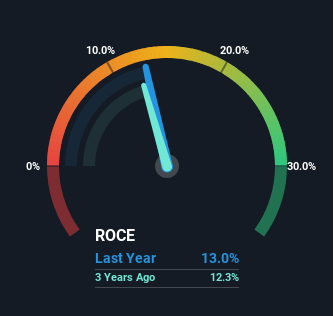
What trends should we look for it we want to identify stocks that can multiply in value over the long term? Firstly, we'd want to identify a growing return on capital employed (ROCE) and then alongside that, an ever-increasing base of capital employed. Ultimately, this demonstrates that it's a business that is reinvesting profits at increasing rates of return. However, after briefly looking over the numbers, we don't think Beiersdorf (ETR:BEI) has the makings of a multi-bagger going forward, but let's have a look at why that may be.
Return On Capital Employed (ROCE): What Is It?
For those that aren't sure what ROCE is, it measures the amount of pre-tax profits a company can generate from the capital employed in its business. To calculate this metric for Beiersdorf, this is the formula:
Return on Capital Employed = Earnings Before Interest and Tax (EBIT) ÷ (Total Assets - Current Liabilities)
0.13 = €1.2b ÷ (€13b - €3.5b) (Based on the trailing twelve months to December 2023).
So, Beiersdorf has an ROCE of 13%. In absolute terms, that's a pretty normal return, and it's somewhat close to the Personal Products industry average of 11%.
View our latest analysis for Beiersdorf

Above you can see how the current ROCE for Beiersdorf compares to its prior returns on capital, but there's only so much you can tell from the past. If you'd like, you can check out the forecasts from the analysts covering Beiersdorf for free.
What The Trend Of ROCE Can Tell Us
On the surface, the trend of ROCE at Beiersdorf doesn't inspire confidence. Around five years ago the returns on capital were 16%, but since then they've fallen to 13%. On the other hand, the company has been employing more capital without a corresponding improvement in sales in the last year, which could suggest these investments are longer term plays. It may take some time before the company starts to see any change in earnings from these investments.
The Bottom Line
To conclude, we've found that Beiersdorf is reinvesting in the business, but returns have been falling. Unsurprisingly, the stock has only gained 38% over the last five years, which potentially indicates that investors are accounting for this going forward. Therefore, if you're looking for a multi-bagger, we'd propose looking at other options.
If you're still interested in Beiersdorf it's worth checking out our FREE intrinsic value approximation for BEI to see if it's trading at an attractive price in other respects.
While Beiersdorf may not currently earn the highest returns, we've compiled a list of companies that currently earn more than 25% return on equity. Check out this free list here.
Valuation is complex, but we're here to simplify it.
Discover if Beiersdorf might be undervalued or overvalued with our detailed analysis, featuring fair value estimates, potential risks, dividends, insider trades, and its financial condition.
Access Free AnalysisHave feedback on this article? Concerned about the content? Get in touch with us directly. Alternatively, email editorial-team (at) simplywallst.com.
This article by Simply Wall St is general in nature. We provide commentary based on historical data and analyst forecasts only using an unbiased methodology and our articles are not intended to be financial advice. It does not constitute a recommendation to buy or sell any stock, and does not take account of your objectives, or your financial situation. We aim to bring you long-term focused analysis driven by fundamental data. Note that our analysis may not factor in the latest price-sensitive company announcements or qualitative material. Simply Wall St has no position in any stocks mentioned.
Have feedback on this article? Concerned about the content? Get in touch with us directly. Alternatively, email editorial-team@simplywallst.com
About XTRA:BEI
Beiersdorf
Manufactures and distributes consumer goods in Europe, the United States, Africa, Asia, and Australia.
Flawless balance sheet with solid track record and pays a dividend.
Similar Companies
Market Insights
Community Narratives



